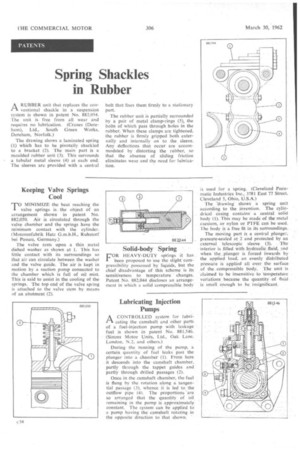Solid-body Spring
Page 78

If you've noticed an error in this article please click here to report it so we can fix it.
FOR HEAVY-DUTY springs it been proposed to use the slight compressibility possessed by liquids, but the chief disadvantage of this scheme is its Sensitiveness to temperature changes. Patent No. 882,044 discloses an arrangement in which a solid compressible body
has is used for a Spring. (Cleveland Pneumatic Industries Inc., 3781 East 77 Street, Cleveland 5, Ohio, U.S.A.)
The 'drawing' shows a spring unit according to the invention. The cylindrical casing contains' a central solid body (1). This may be made of the metal caesium, or nylon or FITE can be used. The body is a free fit in its surroundings.
The moving part is a central .plunger, pressure-sealed at 2 and protected by an external telescopic sleeve (3). The interior is filled with hydraulic .,fluid, and when the _plunger is forced inwards by the applied load, an evenly distributed pressure is applied all oyer, the surface of the compressible body. The unit is claimed to be insensitive to temperature variations because the quantity. of fluid is small enough to he insignificant.
































































































































